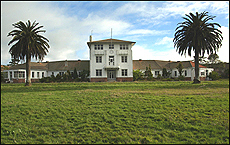|
Allegations of Abuse
in Institutions |
|
|
|
|
|
The police have re-opened the
36-year-old case of a boy's death at Kingseat psychiatric hospital south of A 1968 coroner's finding that
11-year-old Clement Matthews died of pneumonia has been challenged by former
patient Stephen Lindsay, who was 14 at the time. He says he saw a male nurse attack
Clement 12 hours before he was found dying in his locked room. A hospital report said Clement had
been admitted three years earlier because of "mental subnormality"
that resulted in disturbed and aggressive behaviour. A pathologist found no marks of
external violence. Mr Lindsay's lawyer, Sonja Cooper,
last night welcomed the police re-opening the investigation of Clement's
death, which she had requested. "For my client, that's
something that's traumatised him for the last 30 years. It's given him
nightmares. "I think for him to have some
closure on that it's really important." Mr Lindsay is among nearly 200
former patients who have lodged complaints with lawyers alleging mistreatment
in the 1960s and 1970s. The claims, which initially
focused on Two Mr Lindsay said a male nurse
grabbed Clement's shirt collar and pulled him to the ground after the boy had
snatched a piece of bread from a plate while they were waiting for dinner. "Clem hit the floor with a
hell of a thud. The nurse then kicked him hard in his back and I heard
something snap." Clement lay sobbing on the floor
and would not get up. Nurses eventually dragged him upstairs, threw him
face-down on his mattress and locked the door. When the day-nurse opened the door
next morning, Mr Lindsay went close to Clement and heard that he was hardly
breathing. He had thought about telling
someone what happened, but thought no one would believe him. Counties Manukau police
spokeswoman Angeline Barlow said yesterday that the case had been re-opened.
She did not know when the investigation would be completed. "Since it was in 1968, it
takes a while to track down people." News of police re-opening the case
came to light during Weekend Herald inquiries into the widening allegations
of abuse at psychiatric hospitals. More than 100 were at About 15 complaints relate to
Oakley, Kingseat and Tokanui and some also to "We've got a number of our
Porirua clients who ended up in Oakley when [it was] quite a brutal physical
environment from the sounds of it," Ms Cooper said. Other allegation relate to the
Cherry Farm and Seacliff hospitals north of The lawyers have filed nearly 70 cases
in the High Court, seeking compensation of up to $500,000 and exemplary
damages approaching $50,000 for each former patient. Another 40 claims are
nearly ready to be filed. The Government is considering
holding an inquiry, but says it will not decide until it has investigated all
the court claims. The complainants are separate from
those of 95 former The most serious allegations in
the new claims are of sexual assault and beatings by staff and patients. Ms Cooper said patients also told
of electro-convulsive therapy (ECT, or "shock treatment") and drug
injections used as a punishment, being over-sedated and being locked in
seclusion - sometimes in straitjackets - for long periods. Mr Chapman said some of the
patients had conditions such as attention deficit disorder. "Sometimes they were placed
in psychiatric institutions by their parents or families or authorities where
they were state wards, not necessarily because they were thought to be
mentally ill, but because they were difficult to deal with and people
couldn't handle them. "Some were never mentally ill
and should not have been in a psychiatric hospital. "It's hard to think of
anybody who has come through this unscathed. The abuse that some of them have
been through has almost certainly wrecked their lives ... "A lot of them are extremely
dysfunctional and find life a constant struggle. We have people who have
repeatedly tried to kill themselves." Mr Chapman acknowledged that many
mental patients received good care. "I wouldn't want to suggest
that beating patients up or sexually abusing them was standard treatment in
psychiatric hospitals 30 or 40 years ago. I think, however, that there were
some hospitals at least where that kind of abuse was quite extensive." In 1987, Oakley merged with its A psychiatrist, Emeritus Professor
John Werry, said last night that cruelty and sexual abuse were never
tolerated at psychiatric hospitals and he never witnessed them. But psychiatry had leaped forward
"at least 1000 per cent" in New Zealand since the early 1960s when
mental hospitals had slum-like accommodation and few psychiatrists and
treatments. Excessive reliance was placed on
ECT and brain surgery. He knew of four patients being hit
by staff, but did not see it happen. He did not know of staff sexually
abusing patients, although some patients were thought to be having sex with
one another. He said nurses relied on
"ward heavies" - big, assertive patients - to help keep order, but
patients were less violent then than now.
Built in the 1850s as the Whau
Lunatic Asylum in Pt Chevalier, Oakley became the male forensic
unit, dogged by controversy. The merged hospital had 600 beds.
It closed in 1993.
At Karaka, south of Opened in 1932. Closed in 1999
Near Te Awamutu. Opened in 1912 and closed in 1998.
|

